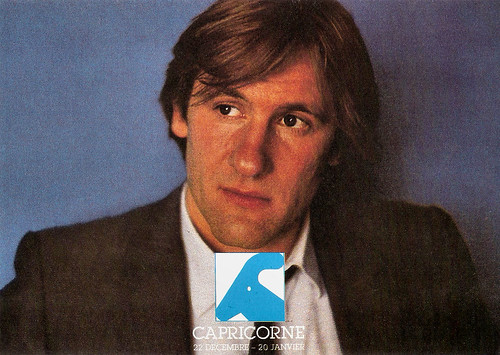
French postcard in the Signes du Zodiaque by Editions F. Nugeron, no. 16. Caption: Capricorn.

French postcard by Editions La Malibran, Nancy, in the collection Cinéma Couleur, no. MC 16. Photo: Georges Pierre. Gérard Depardieu in Danton (Andrzej Wajda, 1983).

British postcard by Artificial Eye. Gérard Depardieu in Cyrano de Bergerac (Jean-Paul Rappeneau, 1990).

French postcard by Sonis, no. C. 854. Photo: United Artists. Gabriel Byrne, Leonardo DiCaprio, John Malkovich, Gérard Depardieu and Jeremy Irons in The Man in the Iron Mask (Randall Wallace, 1998).

Big Happy New Year card by Pathé. Photo: Christian Clavier and Gérard Depardieu in Astérix & Obélix contre César/Asterix and Obelix Take on Caesar (Claude Zidi, 1999).

Vintage autograph card.
Whimsical, aimless thug
Gérard Xavier Marcel Depardieu was born in working-class Châteauroux, France in 1948. He is one of five children of Anne Depardieu-Marillier called ‘la Liette’ and René ‘le Dédé’ Depardieu, a metal worker and volunteer fireman. As a boy, Depardieu spent more time on the street than in the classroom. According to Tracie Cooper at AllMovie: “At twelve years old, he dropped out of school and hitchhiked across Europe on an informal tour funded primarily by the profits of stolen cars and assorted black-market products. Depardieu would likely have continued in his juvenile delinquency were it not for a friend who was attending drama school in Paris.”
So in 1966, Depardieu decided to enrol at the École d'art dramatique too. He began acting in the new comedy theatre Café de la Gare, where he met actors Patrick Dewaere, Coluche, and Miou-Miou. He made his film debut in the short Le beatnik et le minet/The Beatnik and pussy (Roger Leenhardt, 1967). More minor film parts followed. In 1970, he married Élisabeth Guignot, with whom he had two children, actor Guillaume (1971–2008) and actress Julie (1973).
In 1972, he appeared in Nathalie Granger (Marguerite Duras, 1972) with Lucia Bosé. The following year he played in the Horror film Au rendez-vous de la mort joyeuse/At the Meeting with Joyous Death (1973), directed by Juan Luis Buñuel, the son of Luis Buñuel. His breakout film was Bertrand Blier's comedy Les valseuses/Going Places (1974), in which he co-starred with Patrick Dewaere and Miou-Miou. Les valseuses was the 3rd highest-grossing film of the year in France, and his part as a whimsical, aimless thug turned him into France’s young male sensation.
In the following years, he went on to become one of France's most renowned actors with films like Vincent, François, Paul... et les autres/Vincent, François, Paul and the Others (Claude Sautet, 1974) with Yves Montand, Sept morts sur ordonnance/Seven Deaths by Prescription (Jacques Rouffio, 1975) starring Michel Piccoli, and Maîtresse/mistress (Barbet Schroeder, 1976) starring Bulle Ogier. The latter provoked controversy in the United Kingdom and the United States because of its graphic depictions of sadomasochism. Then he was the co-star of Robert de Niro in the Italian epic film Novecento/1900 (Bernardo Bertolucci, 1976). The film chronicles the lives of two men during the political turmoil that took place in Italy in the first half of the 20th century. Also remarkable was La Dernière femme/The Last Woman (Marco Ferreri, 1976) starring Ornella Muti, in which his character mutilates himself.
Another success was the gritty romantic comedy Préparez vos mouchoirs/Get Out Your Handkerchiefs (Bertrand Blier, 1978), which received the Academy Award for Best Foreign Language Film. Other memorable films were Mon oncle d'Amérique/My American Uncle (Alain Resnais, 1980), which won the Grand Prix and the FIPRESCI prizes at the 1980 Cannes Film Festival, the drama Loulou (Maurice Pialat, 1980) with Isabelle Huppert, and Le Dernier Métro/The Last Metro (François Truffaut, 1980) starring Catherine Deneuve. The latter film, set in a small Parisian theatre during the time of the French received Oscar and Golden Globe nominations for Best Foreign Film and won ten Césars. Depardieu himself was awarded for his performance as a resistance fighter. Le Dernier Métro was one of the most popular films of the year in France and one of Truffaut's most successful productions abroad.

French postcard by RCA. Photo: GAMMA. Promotion card for his album 'Ils ont dit moteur...' (1980).

French postcard by La Roue Tourne, Paris.
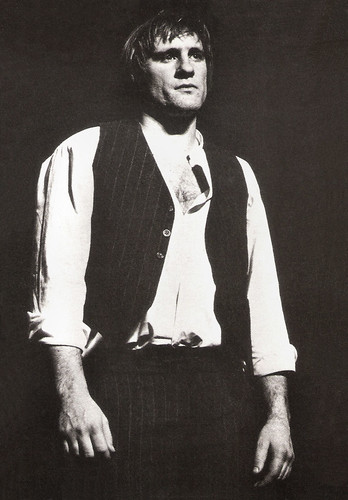
French postcard by Humour a la Carte, Paris, no. 3442. Photo: Ilana Ben-Ari.

Swiss postcard by News Productions, Baulmes, no. 55506. Photo: Pierre-Olivier Deschamps / Agence VU, Paris, 1986.

French card with blank back.

French autograph card with blank back.
Exceptional talent, energy and versatility
During the 1980s Gérard Depardieu’s star continued to rise. Among his most memorable films are Truffaut's final film La femme d'à côté/The Woman Next Door (François Truffaut, 1981), the farce La chèvre/The Goat (Francis Veber, 1981) with Pierre Richard, the medieval drama Le retour de Martin Guerre/The Return of Martin Guerre (1982), and the historical biopic Danton (Andrzej Wajda, 1983).
Ginette Vincendeau writes in Encyclopedia of European Cinema: “Apart from exceptional talent and energy, a key to Depardieu’s success is his versatility. Equally at ease in broad farce and romantic leads, he has been a mainstay of popular cinema.” His international fame grew as a result of his performance as a doomed, hunchbacked farmer in Jean de Florette (Claude Berri, 1986) and Manon des sources (Claude Berri, 1986).
Five years later, he won a César and an Oscar nomination for his starring role in Cyrano de Bergerac (Jean-Paul Rappeneau, 1990). He did not win the Oscar, presumably because Time magazine had run a profile that mistakenly suggested that Depardieu might have ‘participated’ in a rape at the age of nine. The claim was based on an interview carried out 13 years earlier and was the result of an incorrect translation. However, Depardieu crossed over into the American film market by co-starring in Green Card (Peter Weir, 1990).
Ginette Vincendeau: “Like Jean Gabin before him, Depardieu sums up idealised French masculinity, merging working-class virility with romanticism. Exporting himself has meant losing some of these complexities, since Depardieu’s global stardom is, so far, dependent (as was Maurice Chevalier’s) on playing a rather clichéd Frenchness as in Green Card, or even Europeanness, as in Ridley Scott’s 1492 Conquest of Paradise (1992).”
In 1992, while separated from Élisabeth Guignot, he had a daughter, Roxanne, with the model Karine Sylla. In 1996 he divorced Élisabeth and began a relationship with actress Carole Bouquet, who was his partner from 1997 to 2005. Remarkable films from this period include Tous les matins du monde/All the Mornings of the World (Alain Corneau, 1991), Una pura formalità/A Pure Formality (Giuseppe Tornatore, 1994), and Hamlet (Kenneth Branagh, 1996).

French card. Photo: Isabelle Huppert and Gérard Depardieu in Loulou (Maurice Pialat, 1980).

French postcard by Editions La Malibran, Nancy, in the collection Cinéma Couleur, no. MC 39. Publicity still for Loulou (Maurice Pialat, 1979) with Isabelle Huppert.
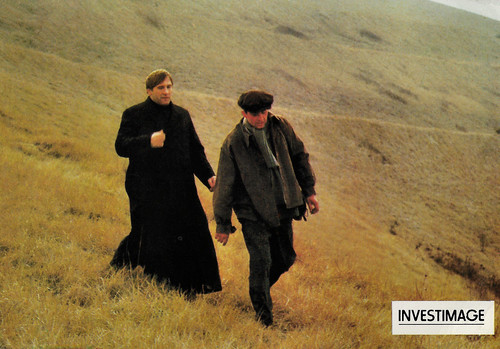
French postcard by F.E.C.V. Photo: Investimage. Gérard Depardieu in Sous le soleil de Satan (Maurice Pialat, 1987).
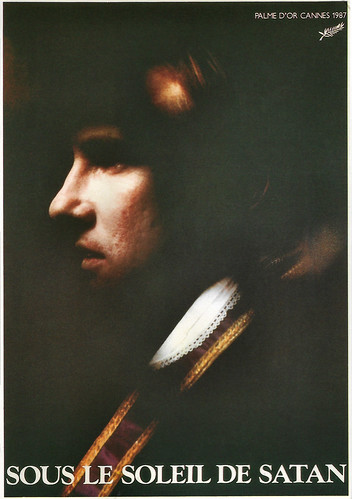
French postcard by Editions Ramsay / F. Nugeron, no. 40. Photo: Gaumont. Gérard Depardieu in Sous le soleil de Satan (Maurice Pialat, 1987). Caption: Palme d'or Cannes 1987.

French postcard. Photo: Artificial Eye. Anne Brochet, Vincent Perez and Gérard Depardieu in Cyrano de Bergerac (Jean-Paul Rappeneau, 1990).

French postcard by Sonis, no. C. 90. French poster for Cyrano de Bergerac (Jean-Paul Rappeneau, 1990) with Gérard Depardieu. Photo: Benoit Berbier. Concept: Serge Fichard, Bruno le Moult.
Obélix
In 1999, Gérard Depardieu played for the first time Obélix in the live-action film Astérix et Obélix contre César/Asterix and Obelix vs. Caesar (Claude Zidi, 1999) with Christian Clavier as Asterix. The film, based on the comic book by René Goscinny, was tremendously successful at the European box offices. There would be three sequels: Astérix & Obélix: Mission Cléopâtre/Asterix & Obelix: Mission Cleopatra (Alain Chabat, 2002), Astérix aux jeux olympiques/Asterix at the Olympic Games (Frédéric Forestier, Thomas Langmann, 2008) and Astérix et Obélix: Au service de Sa Majesté/Astérix and Obélix: God Save Britannia (Laurent Tirard, 2012).
In between he appeared in films as the comedy Le placard/The Closet (Francis Veber, 2001) with Daniel Auteuil, Tais-toi!/Shut Up (Francis Veber, 2003) with Jean Reno, the crime drama 36 Quai des Orfèvres/36 (Olivier Marchal, 2004), the Edith Piaf biopic La môme/La vie en rose (Olivier Dahan, 2007) featuring Marion Cotillard, the crime film L'instinct de mort/Mesrine: Part 1 - Killer Instinct (Jean-François Richet, 2008) and the follow-up L'ennemi public n°1/Mesrine: Part II - Public Enemy #1 (Jean-François Richet, 2008) both starring Vincent Cassel, and the drama À l'origine/In the Beginning (Xavier Giannoli, 2009).
Depardieu attracted attention from the media and legal authorities for his sometimes stormy behaviour. He made a concerted effort to cut back on his alcohol consumption following a heart attack and an emergency quintuple bypass operation, in 2000. In 2003, he officially cut off contact with his son, Guillaume Depardieu when the young man threatened him with a gun and received a suspended prison sentence. Since 2005, he has lived with novelist Clémentine Igou, but in 2006, he had a son, Jean, with Hélène Bizot. Meanwhile, Guillaume made headlines for drug abuse, a motorbike crash and a hospital infection contracted during the post-accident operations, eventually leading to the amputation of his leg. At 37, Guillaume died from complications linked to a sudden case of pneumonia.
In August 2012, Depardieu was accused of assault and battery for punching a motorist in Paris. In November 2012, he was arrested for driving while intoxicated after he fell from his scooter. He has been an official resident of Néchin, Belgium since December 2012. French Prime Minister Jean-Marc Ayrault claimed the reason for the move was to avoid a looming 75% top rate of tax. Depardieu reacted with a public statement he was handing back his French passport. In January 2013, Russian President Vladimir Putin signed an Executive Order granting Russian citizenship to Depardieu. Depardieu soon returned the favour by attacking Putin's critics.
More importantly, he continues to make good films. In La tête en friche/My Afternoons with Margueritte (Jean Becker, 2010) he played an illiterate and lonely man who bonds with an older and well-read woman (Gisèle Casadesus). The comedy Potiche/Trophy Wife (François Ozon, 2010) reunited him with Catherine Deneuve. And he appeared in Life of Pi (Ang Lee, 2012), the TV series Marseille (2016-2018) and Illusions perdues/Lost Illusions (Xavier Giannoli, 2021), based on the classic novel by Honoré de Balzac. During his career, Gérard Depardieu has been nominated 15 times for the César for Best Actor and won it twice, in 1981 and 1991. He was also nominated for an Oscar in 1990 for his role in Cyrano de Bergerac. He is a Chevalier of the Légion d'honneur, Chevalier of the Ordre national du Mérite.

French postcard in the series 'De l'autre côté du miroir' by A.S.C.P.D., no. 1. Illustration: B. Veyri, 1991.

British postcard by Time Out. Photo: Guild. Gérard Depardieu in Le Colonel Chabert (Yves Angelo, 1994). Caption: Back from the dead... To reclaim his life and the woman he loved.

French postcard by Sonis, no. C. 853. Photo: United Artists. Gérard Depardieu and Jeremy Irons in The Man in the Iron Mask (Randall Wallace, 1998).
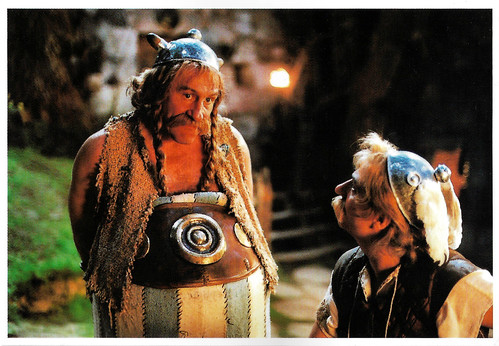
Small French postcard by AGFA / McCann Communications, Nanterre / Renn Productions. Photo: Etienne George. Christian Clavier and Gérard Depardieu in Astérix & Obélix contre César/Asterix and Obelix Take on Caesar (Claude Zidi, 1999).

Belgian Freecard by Boomerang. Photo: Mandarin Cinema.Gérard Depardieu in Potiche/Trophy Wife (François Ozon, 2010). Caption: Mother's child.
Trailer Maitresse (1978). Source: BFI Trailers (YouTube).
Sources: Ginette Vincendeau (Encyclopedia of European Cinema), Tracie Cooper (AllMovie), Yuri German (IMDb), Wikipedia and IMDb.
No comments:
Post a Comment